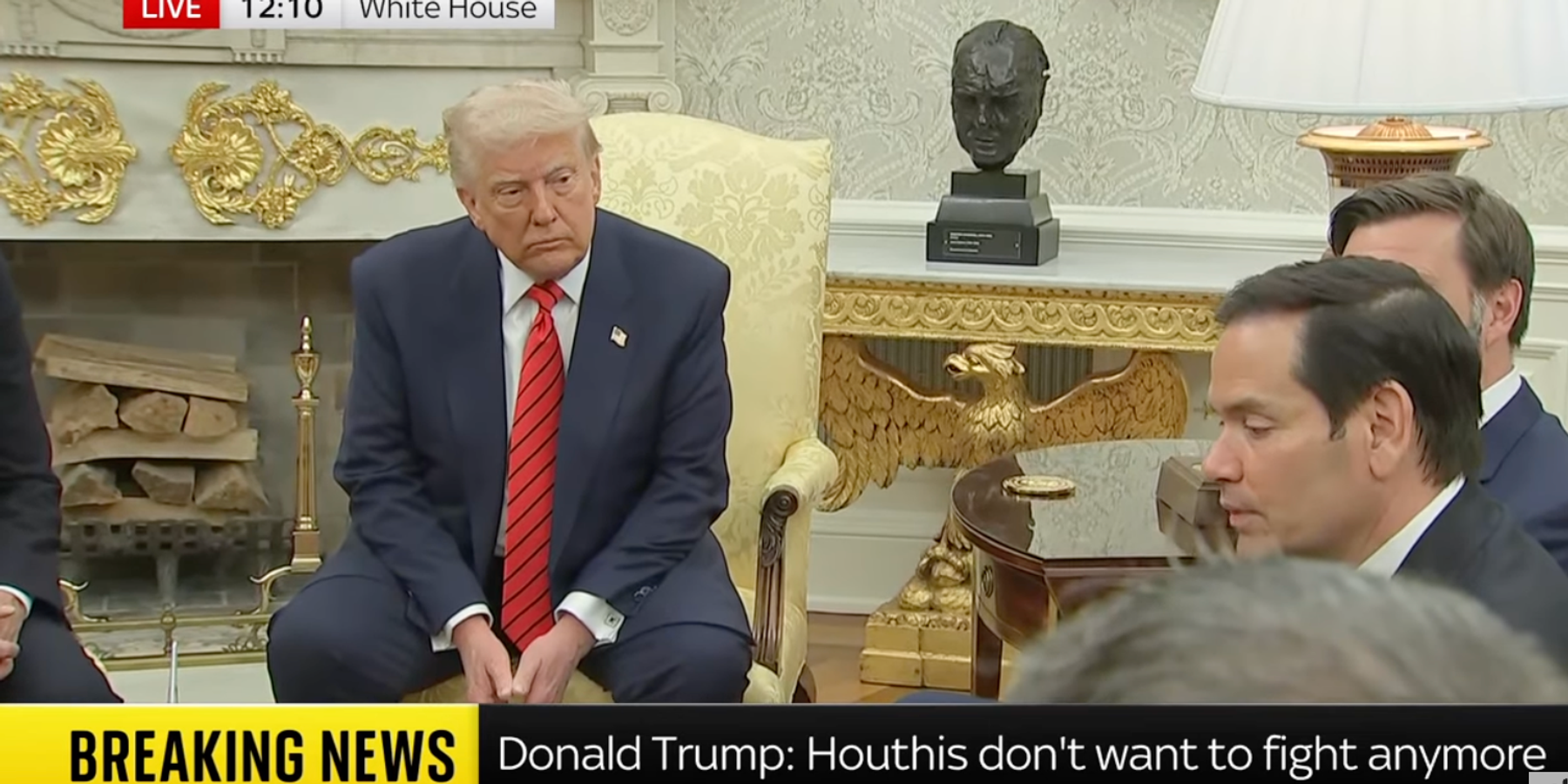Trump described the Houthis as having “capitulated,” saying, "We will stop the bombings. They have capitulated... we will take their word that they will not be blowing up ships anymore, and that's the purpose of what we were doing."
Trump’s announcement generated speculation about whether the agreement included Houthi attacks on Israel — Israel was apparently unaware of the deal — as Trump’s statement appeared to pertain exclusively to Red Sea shipping.
A Houthi missile struck near Ben Gurion airport on May 4, demonstrating that the group is capable of penetrating Israel's Iron Dome and THAAD missile defenses. In response, Israel and the U.S. pummeled Houthi positions as well as crucial infrastructure for Yemeni civilians, including Hodeidah port and Sanaa airport. The U.S. has bombed Yemen every night since March 15, following the decision to launch American attacks despite the lack of any imminent threat to U.S. positions, as acknowledged by administration officials in the Signalgate group chat imbroglio.
It is unclear if the truce with the Houthis is intended to last. President Trump is scheduled to begin the first international trip of his second term on May 13, when he will travel to Saudi Arabia, the UAE, and Qatar. The Gulf states are eager to avoid getting caught in a war between the U.S. and Iran. Tehran has communicated that if America’s Arab partners allow the U.S. to launch attacks from their soil, they will be considered targets for Iranian retaliation.
Therefore, Trump’s announcement may be intended to calm tensions ahead of his meetings with Gulf leaders in Riyadh, Abu Dhabi, and Doha. In this, the announcement may not be unlike his short-lived ceasefire, which Trump pressured Netanyahu to accept in time for his inauguration; Trump then did nothing to ensure that Israel upheld the deal. After initially allowing some aid into Gaza, Israel violated the agreement by blocking all food, water, fuel, and medicine from entering Gaza since March 2, and on March 18, Israel fully abandoned the ceasefire, resuming its daily bombing of the Gaza Strip. Unfortunately, Trump’s interest in calming tensions with the Houthis may only persist as long as he is in the region, trying to secure lucrative deals with his Saudi, Emirati, and Qatari partners.
Yet there is a possibility that the truce with the Houthis could persist at least for the duration of the Trump administration’s negotiations with Tehran over Iran’s nuclear program. Trump’s interest in the talks was reiterated by his decision to fire his National Security Advisor Mike Waltz on May 5, who had colluded with Netanyahu to try to thwart the negotiations.
The Houthi truce may also reflect Trump’s awareness of his base’s preferences. In a post on X on May 2, Representative Marjorie Taylor Greene aired her frustration, saying “I campaigned for no more foreign wars.” She went on, “I don’t think we should be bombing foreign countries on behalf of other foreign countries especially when they have their own nuclear weapons and massive military strength,” making her one of the few Republican politicians willing to question America’s unconditional support for Israel.
The preferences of Trump’s base align with those of his Gulf allies. In recent years, the previously bellicose Saudi Crown Prince Mohammed bin Salman has tried to avoid unnecessary conflict, whether with Tehran or Sanaa, in order to encourage tourism and foreign investment to support Vision 2030, his plan to reduce his kingdom’s reliance on fossil fuels. Both Saudi Arabia and the UAE agreed to a truce with the Houthis in April 2022 after the group had demonstrated that their missiles could hit their capital cities. U.S. bombardment of the Houthis has already cost more than $3 billion, plus seven MQ-9 Reaper drones, each worth millions of dollars, not to mention an embarrassing incident where a F/A-18E Super Hornet fighter jet – worth more than $60 million – fell off a U.S. aircraft carrier into the Red Sea.
For their part, the Houthis maintained they could stop assaults on U.S. warships if American attacks end, but that attacks on Israel would continue until it stops its 18-month war on Gaza.
“The Yemeni people remain committed to their pressure options against the [Israeli] entity until the aggression on Gaza stops and the blockade is lifted,” the statement said. “The Israeli and American aggression will not go unanswered and will not deter Yemen from continuing its supportive stance toward Gaza.”
Although Trump may primarily wish for a pause in Houthi attacks as he seeks to reassure America’s wealthy allies in the Gulf, America’s interests would be best served by avoiding further escalation in the Red Sea. As security analyst Emma Ashford tweeted about the truce: “Declaring victory and going home is often not the worst strategic choice.”
- Massie interview: Houthi strikes 'not America First' ›
- US airstrikes against Houthis show there's 'free riding' in Red Sea, too ›
















